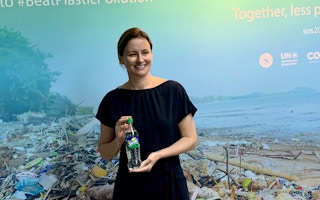Drinking from a bottle made from recycled plastic could be potentially harmful to human health, because of chemicals leaching from the bottle into the drink, a new study has found.
To continue reading, subscribe to Eco‑Business.
There's something for everyone. We offer a range of subscription plans.
- Access our stories and receive our Insights Weekly newsletter with the free EB Member plan.
- Unlock unlimited access to our content and archive with EB Circle.
- Publish your content with EB Premium.
Researchers from Brunel University in the United Kingdom found 150 chemicals that had leached into drinks from their plastic bottles, with 18 of those chemicals found at levels exceeding health regulations, the research published in the Journal of Hazardous Materials found.
The level of contamination was found to be higher in bottles made from recycled Polyethylene Terephthalate (PET) — the most common type of reused plastic — compared to those made from virgin PET.
The chemicals found in the drinks are known as food contact chemicals, which are safe in low concentations. Those identified in the study include endocrine-disrupting chemicals that can cause cancers, birth defects, and other developmental disorders. They were found to come from a range of sources, such as the catalysts and additives used in the PET recycling process.
The conditions that lead to chemical contamination include how bottles are filled, stored, distributed, and shelved. If bottles are exposed to high levels of humidity or sunlight, there’s a greater chance of contamination, the study said.
The research comes as consumer goods companies respond to pressure to use more recycled content in their packaging to help reduce plastic pollution. More than 60 countries have implemented bans and levies on plastic packaging and single-use waste, aimed at reducing use and improving waste management.
Coca-Cola, which regularly tops rankings of the biggest plastic polluters from global beach clean-up audits, plans to make all of its packaging 100 per cent recyclable by 2025 and incorporate reused plastic in at least half of its packaging by 2030. The company makes 100 billion bottles of single-use plastic every year.
PepsiCo has committed to use recycled plastic for its Pepsi brand in Europe this year, while consumer goods company, Unilever has pledged to halve the amount of virgin plastic it uses, and ramp up its recycled content, by 2025.
Currently, only 9 per cent of plastic produced is recycled. The rest is sent to landfill, incinerated or enters the environment, largely through waterways.
The findings of the study reflect the need for recyclers to improve how they collect, sort and reprocess PET bottles, and for bottle manufacturers to design containers that can more easily be recycled to improve their quality, its authors said.
They suggested that used PET is thoroughly cleaned before it is recycled, using a three-stage process known as “super cleaning”. This involves washing at high temperatures using gas and chemical cleaners.
The study’s author, Dr Eleni Iacovidou, a lecturer from Brunel’s Centre for Pollution Research and Policy, said the study shows that there is a need to move away from a dependence on PET for food and beverages.
Around 1.3 billion plastic bottles are used every day, and an estimated 1.3 billion tonnes of plastic is destined for the environment by 2040 at the current rates of production, according to a University of Leeds study.
Investment is needed in alternatives to plastic bottles, such as water filters or larger water containers, said Iacovidou.
“If we reduce our consumption of PET then we will drive change further up the system. Less demand equals less production in the first place,” she said.
More transparency and improved communication around the production, consumption, and management of plastic are also needed to create a circular economy for the material that factors in health and safety considerations, she said.
The health implications of plastic contamination have yet to be properly studied beyond how much of the material is entering the human food system. A 2019 study by World Wide Fund for Nature found that people eat the equivalent of a credit card of microplastic every week, mainly in plastic-infused drinking water but also in foods such as shellfish.
Plastic was found in human faeces for the first time in 2018. Researchers discovered both PET and polypropylene, which is used to make food packaging, in the stools of people in Japan, Finland, Italy, the Netherlands, Poland, Russia, the UK and Austria.
Global plastic production has increased from 270 million tonnes in 2010 to 370 million tonnes in 2020. It is projected to grow to 480 million tonnes by 2030, by which time 58.4 million tonnes of plastic will enter the ocean every year.
A resolution, agreed at the UN environment assembly in Nairobi, Kenya earlier this month called for a treaty covering the “full lifecycle” of plastics from production to disposal, to be negotiated over the next two years.








